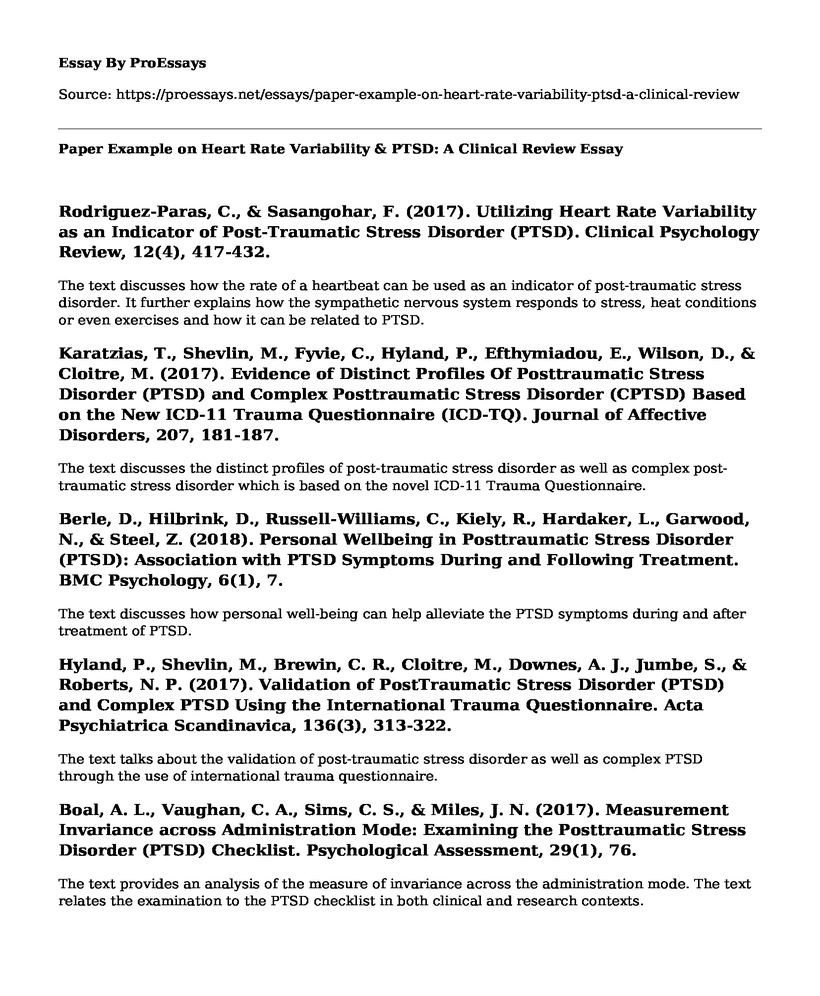Rodriguez-Paras, C., & Sasangohar, F. (2017). Utilizing Heart Rate Variability as an Indicator of Post-Traumatic Stress Disorder (PTSD). Clinical Psychology Review, 12(4), 417-432.
The text discusses how the rate of a heartbeat can be used as an indicator of post-traumatic stress disorder. It further explains how the sympathetic nervous system responds to stress, heat conditions or even exercises and how it can be related to PTSD.
Karatzias, T., Shevlin, M., Fyvie, C., Hyland, P., Efthymiadou, E., Wilson, D., & Cloitre, M. (2017). Evidence of Distinct Profiles Of Posttraumatic Stress Disorder (PTSD) and Complex Posttraumatic Stress Disorder (CPTSD) Based on the New ICD-11 Trauma Questionnaire (ICD-TQ). Journal of Affective Disorders, 207, 181-187.
The text discusses the distinct profiles of post-traumatic stress disorder as well as complex post-traumatic stress disorder which is based on the novel ICD-11 Trauma Questionnaire.
Berle, D., Hilbrink, D., Russell-Williams, C., Kiely, R., Hardaker, L., Garwood, N., & Steel, Z. (2018). Personal Wellbeing in Posttraumatic Stress Disorder (PTSD): Association with PTSD Symptoms During and Following Treatment. BMC Psychology, 6(1), 7.
The text discusses how personal well-being can help alleviate the PTSD symptoms during and after treatment of PTSD.
Hyland, P., Shevlin, M., Brewin, C. R., Cloitre, M., Downes, A. J., Jumbe, S., & Roberts, N. P. (2017). Validation of PostTraumatic Stress Disorder (PTSD) and Complex PTSD Using the International Trauma Questionnaire. Acta Psychiatrica Scandinavica, 136(3), 313-322.
The text talks about the validation of post-traumatic stress disorder as well as complex PTSD through the use of international trauma questionnaire.
Boal, A. L., Vaughan, C. A., Sims, C. S., & Miles, J. N. (2017). Measurement Invariance across Administration Mode: Examining the Posttraumatic Stress Disorder (PTSD) Checklist. Psychological Assessment, 29(1), 76.
The text provides an analysis of the measure of invariance across the administration mode. The text relates the examination to the PTSD checklist in both clinical and research contexts.
Fried, E. I., Eidhof, M. B., Palic, S., Costantini, G., Huisman-Van Dijk, H. M., Bockting, C. L., & Karstoft, K. I. (2018). Replicability and Generalizability of Posttraumatic Stress Disorder (PTSD) Networks: A Cross-Cultural Multisite Study of PTSD Symptoms in Four Trauma Patient Samples. Clinical Psychological Science, 6(3), 335-351.
The text discusses the replicability nature and generalization of PTSD networks through the study of cross-cultural multisite study of the symptoms of post-traumatic stress disorder patients.
Simon, N., McGillivray, L., Roberts, N. P., Barawi, K., Lewis, C. E., & Bisson, J. I. (2019). Acceptability of Internet-Based Cognitive Behavioural Therapy (I-CBT) For Post-Traumatic Stress Disorder (PTSD): A Systematic Review. European Journal of Psychotraumatology, 10(1), 1646092.
The text discusses the systematic review of whether internet-based cognitive behavioural therapy is acceptable in the treatment of post-traumatic stress disorder.
Bisson, J., & Andrew, M. (2007). Psychological Treatment of PostTraumatic Stress Disorder (PTSD). Cochrane Database of Systematic Reviews, (3).
The text explores the various psychological treatment modes that can be used in the treatment of PTSD patients as well as use in research on the same.
Shalev, A., Liberzon, I., & Marmar, C. (2017). Post-traumatic Stress Disorder. New England Journal of Medicine, 376(25), 2459-2469.
The article discusses into details the nature of PTSD and the possible potential causes. The text also reports on the diagnosis procedure, the prevalence, the neurobiological traits and the clinical treatment of PTSD. Finally, the document addresses the clinical implications of the knowledge of PTSD.
Schweizer, S., Samimi, Z., Hasani, J., Moradi, A., Mirdoraghi, F., & Khaleghi, M. (2017). Improving Cognitive Control in Adolescents with Post-Traumatic Stress Disorder (PTSD). Behaviour Research and Therapy, 93, 88-94.
The text explains the modes that can be used to improve the cognitive control in adolescents who have PTSD, the symptoms of PTSD that can be reduced by effective memory training and how adaptive emotion can be increased.
Cite this page
Paper Example on Heart Rate Variability & PTSD: A Clinical Review. (2023, Jul 24). Retrieved from https://proessays.net/essays/paper-example-on-heart-rate-variability-ptsd-a-clinical-review
If you are the original author of this essay and no longer wish to have it published on the ProEssays website, please click below to request its removal:
- Article Review Sample: Poverty and Its Effects on Child and Family
- Food Journal Analysis Paper Example
- Consumer Target Audience
- The Hurting Healthcare Cost Essay Example
- Is Depression Affected by Gender? Essay Example
- Culture as a Social Determinant of Mental and Behavioral Health Paper Example
- Essay on 33% of Americans Suffer High Stress Levels: Impact on Health







